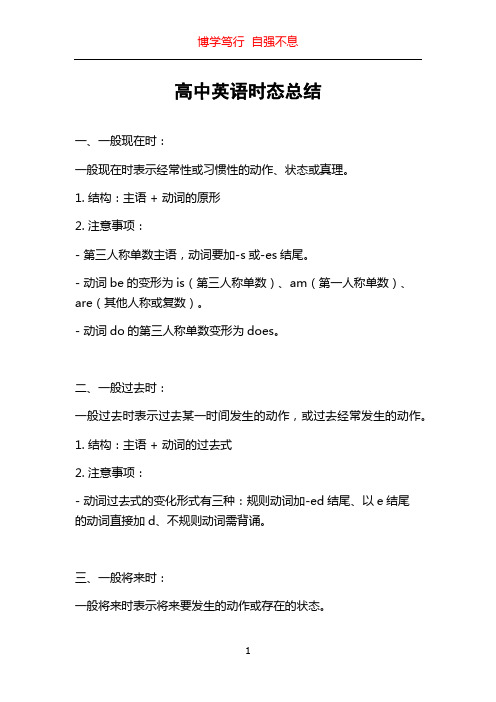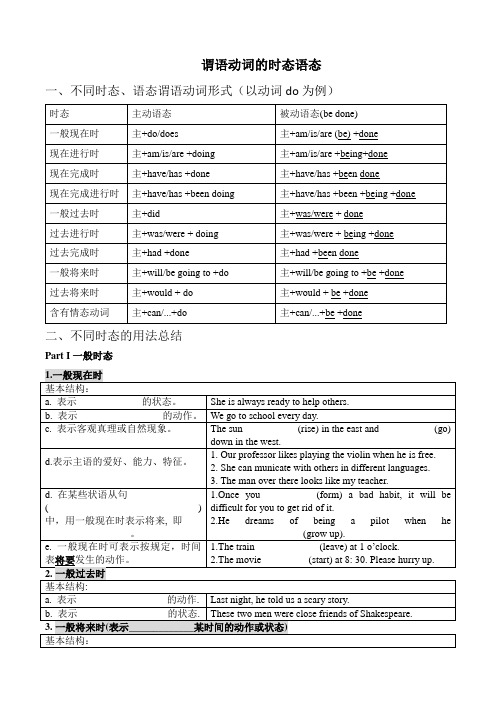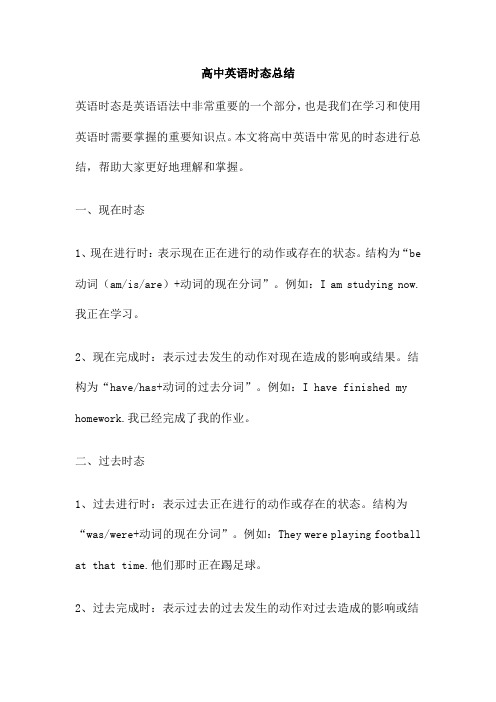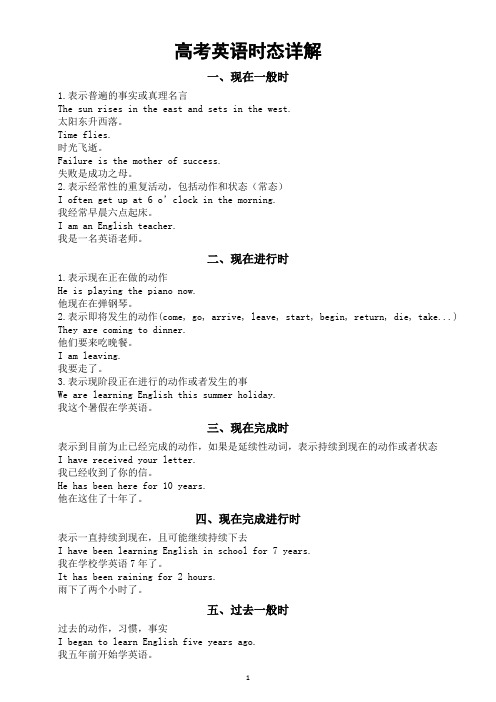高一英语时态语态复习
高中英语时态总结

高中英语时态总结一、一般现在时:一般现在时表示经常性或习惯性的动作、状态或真理。
1. 结构:主语 + 动词的原形2. 注意事项:- 第三人称单数主语,动词要加-s或-es结尾。
- 动词be的变形为is(第三人称单数)、am(第一人称单数)、are(其他人称或复数)。
- 动词do的第三人称单数变形为does。
二、一般过去时:一般过去时表示过去某一时间发生的动作,或过去经常发生的动作。
1. 结构:主语 + 动词的过去式2. 注意事项:- 动词过去式的变化形式有三种:规则动词加-ed结尾、以e结尾的动词直接加d、不规则动词需背诵。
三、一般将来时:一般将来时表示将来要发生的动作或存在的状态。
1. 结构:主语 + will + 动词的原形2. 注意事项:- 当主语为第一人称时,可用shall代替will。
- 当表示将来的时间副词或状语连用时,将来时常和动词的原形连用。
四、现在进行时:现在进行时表示现在正在发生的动作。
1. 结构:主语 + am/is/are + 动词的ing形式2. 注意事项:- 动词-ing形式的构成规则为动词原形结尾加-ing。
- 动词末尾的e需去掉,再加-ing。
- 重读闭音节,末尾只有一个辅音字母时,应将末尾辅音字母双写,再加-ing。
五、过去进行时:过去进行时表示过去某一时间正在进行的动作。
1. 结构:主语 + was/were + 动词的ing形式2. 注意事项:- 动词-ing形式的构成规则同现在进行时。
- 句中使用过去进行时时,一般还需要使用表状态动词的动词-ing 形式。
六、将来进行时:将来进行时表示将来某一时间正在进行的动作。
1. 结构:主语 + will be + 动词的ing形式2. 注意事项:- 动词-ing形式的构成规则同现在进行时。
七、一般过去将来时:一般过去将来时表示过去的某个过去时间点本来要发生的事情,但实际上未发生。
1. 结构:主语 + would + 动词的原形2. 注意事项:- would在句中只表示动词的一种形式,无人称和数的变化。
高中时态语态归纳总结导学案高考英语一轮复习

谓语动词的时态语态一、不同时态、语态谓语动词形式(以动词do为例)二、不同时态的用法总结Part I一般时态三、被动语态时态语态专练一.画出下列句子(包括从句)中的谓语动词,并写出其时态语态。
1.This afternoon, we had our chemistry class in the science lab.2. She is studying at an American high school for a year.3. My name is Adam and I’m a freshman at senior high school.4. You should encourage your friend to try new hobbies.5. There, a boat will take you to stay with a local Urus family on an island for three days.6. I’ve been studying English since primary school.7. The team that Lang Ping had built was falling apart.8. One of the best players had been injured, and the team captain had to leave because of heart problems.9. Foreign aid is being organized for the tsunamihit countries.10. China’s ancient civilization has continued all the way through into modern times.11. Some of the symbols can still be seen in today’s hanzi.12. Listening to English radio programme helps me to get used to an English language environment.13. Water from the dam would likely damage a number of temples and destroy cultural relics.14. A mittee was established to limit damage to the Egyptian buildings and prevent the loss of cultural relics.15. Nearly 500,000 highquality digital photographs have been produced since the international project started in 1994.16. Billions of trees are being cut down every day to make paper for humans.17. I sincerely hope that you will be admitted to your ideal university.18. When I was a little child, I once said to my grandmother that I would buy her a big house. 二.用括号里动词的正确形式填空1. A meeting _____________(hold) in Nanjing from March 22 to 24, 2023.2. Then, one day in 1945, Marcel ____________(give) another opportunity by the mountain.3. Since then, Marcel __________(make) mountain climbing his life’s work.4. Spending too much time online ________(make) it difficult to focus on other things in life.5. When I got to the theater, I found out that the tickets __________________________(sell out).6. In the last few years, thousands of films ________________________(produce) all over the world.7. In the near future, more advances in science technology _______________________(make) by scientists.8. The experts are discussing how the cultural relics can _________(save).9. With the help of my teacher, I __________(make) great progress in English so far.10. Tom _________(visit) his grandparents every weekend.11. The problem ______________(solve) sooner or later.12. I ______________(do) my homework in my room as usual when I heard someone screaming.13. The pany _____________(develop) a new app and it will appear on the market next year.14. I went to Ningxia and __________(stay) there for a year.15. Could I use your car? Mine ________________(repair) in the garage now.16. The book __________________(translate) into many languages since it _____________(publish) in 1973.17. He promised that he_____________(marry) me, but three months later he went abroad.18. An autumn outing _______________(hold) next Friday by our school to enrich our school life .19. The China International Search and Rescue Team (CISAR) ____________(form) in 2001 and is now made up of several hundreds of rescue workers and about 20 sniffer dogs.20. Rescue workers ___________(train) to find people, treat injuries, and hand out food, water, and other supplies.21. In 1961, the first temple __________(move) by German engineers.22. When the project ended in 1980, it ___________(consider) a great success.23. This semester is about to end. M y parents and I ______________(travel) to Xi’an this winter vocation.24. On most Sundays, the sounds of hammers and other tools striking stones can ____________(heard) in Xochiaca, an ancient village in Mexico.25. The ChineseCanadian _______(win) the 18th International Chopin Piano petition in Warsaw in 2021 at the age of 24.。
【高一】英语中的16种时态(全)

动词16个时态一、一般现在时1.概念:表示经常发生的情况;有规律出现的情况;总是发生的;和事实真理。
2.时间状语:Always, usually, often, sometimes, every wee (day, year, month…),once a wee(day, year, month…),on Sundays(on Mondays …),3.基本结构:动词原形(如主语为第三人称单数,动词上要改为第三人称单数形式)4.否定形式:主语 + am/is/are + no t + 其他;此时态的谓语动词若为行为动词,则在其前加don't,如主语为第三人称单数,则用doesn't,同时还原行为动词。
5.一般疑问句:把be动词放于句首;用助动词do提问,如主语为第三人称单数,则用does,同时,还原行为动词。
6.例句:It seldom snows here.这里很少下雪。
He is always ready to help others.他总是乐于帮助别人。
Action speas louder than words.事实胜于雄辩。
二、一般过去时1.概念:过去某个时间里发生的动作或状态;过去习惯性、经常性的动作、行为。
2.时间状语:ago, yesterday, the day before yesterday, last wee, last(year, night, month…),in 1989,just now, at the age of 5,one day, long long ago, once upon a time, etc.3.基本结构:主语 + 动词的过去式或be的过去式+名词4.否定形式:主语 + was/were + not + 其他;在行为动词前加didn't,同时还原行为动词。
5.一般疑问句:was或were放于句首;用助动词do的过去式did 提问,同时还原行为动词。
高一英语必考知识点全部

高一英语必考知识点全部英语学习对于高中生来说,是一项必修课程,也是重要的考试内容。
下面就是为大家总结的高一英语必考知识点。
一、语法知识点1. 动词时态与语态英语中有多种时态,例如一般现在时、一般过去时、现在进行时等。
了解各个时态的构成和用法,以及被动语态的形式与应用。
2. 从句结构与用法了解主从复合句的构成和关系,包括定语从句、名词性从句和状语从句等。
掌握从句引导词的用法和位置。
3. 并列连词与关联词熟悉常用的并列连词如and、but、or以及关联词如because、although等。
掌握它们的用法和连接不同句子成分的能力。
4. 句型转换与句子结构调整学会对句子进行转换和调整,如同义句转换、被动语态转换、间接引语转换等。
二、词汇知识点1. 常用词汇掌握常用的英语单词和短语,包括名词、动词、形容词和副词等。
积累词汇的同时,了解它们的词性和用法。
2. 同义词和反义词学会识别和运用同义词和反义词,提高语言的表达能力。
注意它们的用法和搭配。
3. 词组与固定搭配了解一些常见的词组、习语和固定搭配,并能正确运用于实际语境中。
三、阅读理解知识点1. 阅读技巧掌握阅读理解的技巧,包括略读、扫读和精读。
了解如何根据问题和选项进行有针对性的阅读。
2. 理解文章结构学会分析文章的结构,包括段落的顺序、主题句和支持句的关系等。
能够准确地找到文章的主旨和关键信息。
3. 掌握常见题型熟悉并掌握常见的阅读理解题型,如选择题、填空题、判断题和配对题等。
了解不同题型的解题思路和答题技巧。
四、写作技巧知识点1. 作文结构掌握作文的结构,包括引言、正文和结论。
确保文中的段落有机衔接,逻辑清晰。
2. 表达思想能够清晰地表达自己的思想和观点,运用适当的词汇和句子结构。
写作时要注意语法和拼写错误。
3. 文章连贯性写作时注意段落和句子之间的连贯性,使用适当的过渡词和连接词,使文章更易读懂,逻辑更清晰。
五、听力技巧知识点1. 听力细节在听力理解中,要注意捕捉细节信息,如数字、日期、时间等。
高中英语时态总结

高中英语时态总结英语时态是英语语法中非常重要的一个部分,也是我们在学习和使用英语时需要掌握的重要知识点。
本文将高中英语中常见的时态进行总结,帮助大家更好地理解和掌握。
一、现在时态1、现在进行时:表示现在正在进行的动作或存在的状态。
结构为“be 动词(am/is/are)+动词的现在分词”。
例如:I am studying now.我正在学习。
2、现在完成时:表示过去发生的动作对现在造成的影响或结果。
结构为“have/has+动词的过去分词”。
例如:I have finished my homework.我已经完成了我的作业。
二、过去时态1、过去进行时:表示过去正在进行的动作或存在的状态。
结构为“was/were+动词的现在分词”。
例如:They were playing football at that time.他们那时正在踢足球。
2、过去完成时:表示过去的过去发生的动作对过去造成的影响或结果。
结构为“had+动词的过去分词”。
例如:They had finished their work before we arrived.他们在我们到达之前已经完成了他们的工作。
三、将来时态1、将来进行时:表示将来某个时间正在进行的动作或存在的状态。
结构为“will+be动词+动词的现在分词”。
例如:I will be studying at 9 o’clock tomorrow.我明天9点将会在学习。
2、将来完成时:表示将来某个时间已经完成的动作或达到的状态。
结构为“will+have+动词的过去分词”。
例如:I will have finished my homework by 10 o’clock tonight.我将在今晚10点之前完成我的作业。
以上是高中英语中常见的时态总结,希望能够帮助大家更好地理解和掌握英语时态。
需要注意的是,不同的时态有着不同的用法和结构,大家在使用时需要根据语境选择合适的时态。
高中英语高考复习时态详细讲解(共16类)

高考英语时态详解一、现在一般时1.表示普遍的事实或真理名言The sun rises in the east and sets in the west.太阳东升西落。
Time flies.时光飞逝。
Failure is the mother of success.失败是成功之母。
2.表示经常性的重复活动,包括动作和状态(常态)I often get up at 6 o’clock in the morning.我经常早晨六点起床。
I am an English teacher.我是一名英语老师。
二、现在进行时1.表示现在正在做的动作He is playing the piano now.他现在在弹钢琴。
2.表示即将发生的动作(come, go, arrive, leave, start, begin, return, die, take...) They are coming to dinner.他们要来吃晚餐。
I am leaving.我要走了。
3.表示现阶段正在进行的动作或者发生的事We are learning English this summer holiday.我这个暑假在学英语。
三、现在完成时表示到目前为止已经完成的动作,如果是延续性动词,表示持续到现在的动作或者状态I have received your letter.我已经收到了你的信。
He has been here for 10 years.他在这住了十年了。
四、现在完成进行时表示一直持续到现在,且可能继续持续下去I have been learning English in school for 7 years.我在学校学英语7年了。
It has been raining for 2 hours.雨下了两个小时了。
五、过去一般时过去的动作,习惯,事实I began to learn English five years ago.我五年前开始学英语。
高一英语语法点归纳大全

高一英语语法点归纳大全一、时态一般现在时用法表示经常性或习惯性的动作或存在的状态。
例如:I get up at 6:30 every day.(我每天六点半起床。
)表示客观事实、普遍真理等。
The earth moves around the sun.(地球绕着太阳转。
)构成:主语+ 动词原形(当主语为第三人称单数时,动词需加s 或es)一般过去时用法:表示过去某个时间发生的动作或存在的状态。
I visited my grandparents last weekend.(我上周末去看望了我的祖父母。
)构成:主语+ 动词的过去式一般将来时用法:表示将来要发生的动作或存在的状态。
will + 动词原形:I will go to the park tomorrow.(我明天将去公园。
)be going to + 动词原形:He is going to study abroad next year.(他明年打算出国留学。
)现在进行时用法:表示现在正在进行的动作。
She is reading a book now.(她现在正在读书。
)构成:主语+ am/is/are + 动词的现在分词过去进行时用法:表示过去某一时刻或某一段时间正在进行的动作。
I was watching TV at 8 o'clock last night.(昨晚八点我正在看电视。
)构成:主语+ was/were + 动词的现在分词二、语态主动语态:句子的主语是动作的执行者。
例如:The cat catches the mouse.(猫抓老鼠。
)被动语态构成:be + 及物动词的过去分词一般现在时的被动语态:am/is/are + 过去分词。
The book is read by many people.(这本书被很多人阅读。
)一般过去时的被动语态:was/were + 过去分词。
The house was built in 1990.(这座房子建于1990 年。
高一英语语法时态讲解及强化复习攻略

高一英语语法时态讲授及强化复习攻略【导语】高一英语语法时态是高一期末考试中的重要知识点,也是高一英语期末考试中的重难点之一,所以我们要做好相应的复习。
下面是作者为您整理的高一英语语法时态讲,期望对您有所帮助!高一英语语法时态讲授一、现在进行时1. 表示现在 (说话瞬时) 正在进行或产生的动作。
[例句] He is reading a newspaper now.2. 表示当前一段时间内的活动或现阶段正在进行的动作 (说话时动作不一定正在进行)。
[例句] What are you doing these days?3. 表示说话人现在对主语的行动表示称赞或厌恶等, 常与always, constantly, continually等副词连用。
[例句] He is always thinking of others.4. 表示在最近按计划或安排要进行的动作。
常限于go, come, leave, start, arrive等表“移动”、“方向”的词。
[例句] He is coming to see me next week.二、过去进行时1. 表示过去某时正在进行的动作。
[例句] He was sleeping when Mary came to see him.2. 动词go, come, leave, arrive, start等的过去进行常常表过去将来时。
[例句] She said she was going to Beijing the day after tomorrow.三、一样现在时1. 表示现在习惯或常常反复产生的动作或存在的状态, 常与usually, always, sometimes, often, every day / week / month / year等时间状语连用。
[例句] He often does his homework in his study.2. 表示主语现在的特点、性情和状态。
- 1、下载文档前请自行甄别文档内容的完整性,平台不提供额外的编辑、内容补充、找答案等附加服务。
- 2、"仅部分预览"的文档,不可在线预览部分如存在完整性等问题,可反馈申请退款(可完整预览的文档不适用该条件!)。
- 3、如文档侵犯您的权益,请联系客服反馈,我们会尽快为您处理(人工客服工作时间:9:00-18:30)。
高一英语时态语态复习一、动词的种类英语的时态是通过动词的变化来体现的。
因此,了解动词的形式及其变化规律非常重要。
英语的实义动词有以下五种形式:即:动词原形、第三人称单数形式、过去式、现在分词和过去分词。
如:四、动词被动语态1.当句子的主语是动作的执行者时,谓语的形式叫主动语态。
句子的主语是动作承受者时,谓语的形式叫被动语态。
Exercises:一、用括号内动词的适当形式填空。
1. It is a fine day. The sun __________(shine) brightly.2. They ___________(visit) the Science Museum next Sunday.3. Mr Brown________(live) in Beijing since he came to China.4. Mr Wang ________(teach) us English two years ago.5. The Smiths _______________( watch) TV at this time last night.6. We __________(learn) about ten English songs by the end of last term.7. Father said that he ____________(buy) a new bike for me the next Friday.8. Bill isn¡¯t here. He ___________(chat) with his friends in the classroom.9. The teacher said that the moon __________(go) round the earth.10. The Young Pioneers will go to the zoo if it ____________(not rain) this Sunday.11. Listen! They __________(talk) about the new film.12. Jim asked us what ___________(happen) in China in 1976.13. My mobile phone ___________(steal) on a bus last week.14. The host ____________(interview) the little boy just now.15. The Greens __________(watch) TV now.16. He said that he _____________(ring) me up when he got there.17. We ____________(learn) English for about three years.18. My brother_____________(join) the League in 1997.19. The farmers __________(pick) apples when I saw them.20. The red skirt __________(cost) the girl forty yuan.21. The film ____________(begin) when I got to the cinema.22. The girl told me that she wanted to be a teacher when she _____(grow) up.23. My sister is a student and she _____________(study) at a middle school nearby.24. Mr Li __________(travel) to several places in South China since he came here.25. You _________(catch) the early bus if you get up early.26. _______you been________(wear) glasses all the time?27. I’ll go home as soo n as I _______(finish) my homework.29. Most science books are ______(write) in English.30. I ____________(stay) there for two months last year.二.选择正确答案。
31. Tell Lily to call me as soon as she _______.A. will arriveB. gets thereC. has goneD. reach here32. ----Hi, Kate. You look tired. What’s the matter? ----I ______ well last night.A. didn’t sleepB. don’t sleepC. haven’t sleptD. won’t sleep33. ----Excuse me, look at the sign over there, please. Could you stop smoking?----Sorry, I ____ that.A. didn’t seeB. don’t seeC. won’t seeD. can’t see34. ----Well, I found this. I think it must be yours. ----My watch! Thank you. Where _____it?A. do you findB. had you foundC. were you findingD. did you find35. ----Don you know when Dr White ____ for dinner this evening?----No, but I think he ____ when he is free.A. will come; comesB. will come; will comeC. comes; comesD. comes; will come36. Look at those black clouds. It _____ rain. Let’s hur ry. A. maybe B. wouldC. hasD. is going to37. ----Jimmy is leaving for a holiday. ----Really? Where ____ he ____?A. has; goneB. will; goC. did; goD. does; go38. ----Shall we go shopping now? ---Sorry, I can't. I ____ my shirts.A. washB. washesC. washedD. am washing39. ----I called you yesterday evening, but there was no answer.----Oh, I am sorry. I ___ dinner at my friend's home.A. haveB. hadC. was havingD. have had40. The Oriental Pearl TV Tower ____ thousands of visitors since 1995.A. attractedB. attractsC. has attractedD. will attract46. ----Why didn't you go to the cinema yesterday? -----Because I ____ the film before.A. had seenB. have seenC. have watchedD. has watched47. I don't think John saw me. He ____ a book at that moment.A. just readB. has just readC. was just readingD. had just read48. Mr Smith ____ a book about China last year but I don't know whether he has finished it.A. has writtenB. wroteC. had writtenD. was writing49. Mr White ____ the newspaper while his daughter ____TV.A. has read; was watchingB. was reading; watchedC. was reading; was watchingD. reading; watched50. ---- I ____ you at the meeting. Why? ----I was ill. A. saw B. have seenC. not seeD. didn't see51. The 29th Olympic Games ____ in Beijing in 2008. A. hold B. will hold C. will be held D. held52. Hurry up! The play ____ for ten minutes. A. has been on B. has begun C. had begun D. began53. ----May I speak to Mr Smith? ----Sorry, he ____ Australia. But he ____ in two days.A. has been to; will come backB. has gone to; will be backC. has been in; would come backD. is leaving for; doesn't come back54. I can't go to the theater tonight because I ____ my ticket.A. have lostB. had lostC. will loseD. was losing55. ----What a nice bike! How long ____ you ____ it? ----Just two weeks.A. have; boughtB. did; buyC. have; hadD. are; having56. ----I'm sorry to have kept you waiting. ----Oh, not at all. I ____ here only for a few minutes.A. have comeB. had beenC. wasD. have been57. ----____ my dictionary anywhere? ---- Yes. I saw it on your desk a moment ago.A. Did you seeB. If you seeC. Had you seenD. Would you see58. We were all surprised when he mad it clear that he ____ office soon.A. leavesB. would leaveC. will leaveD. had left三、用正确的动词的时态和语态翻译下列句子。
